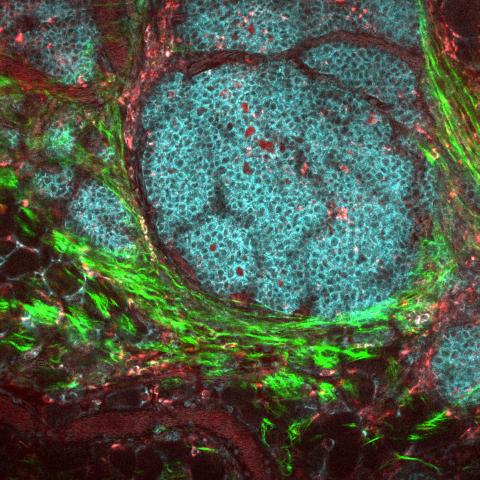Cancer Biology
Cancer Biology
Identifying signatures
of disease
Identifying signatures
of disease
The world is decades into cancer research and still there is much to learn. Large-scale studies of genetic changes in tumors reveal that cancer is not one, but thousands of different diseases at the molecular level. And a patient’s genetic information does not always lead to effective cancer treatment.
At PNNL, cancer biologists work to understand how genetic changes affect the function of tumor cells. To do this, we study the cancer proteome—the entire complement of proteins that is or can be expressed by the cancer cells—as well as the changes that occur in proteins after they are made.
PNNL is one of the Proteome Characterization Centers organized by the National Cancer Institute’s Clinical Proteomic Tumor Analysis Consortium. These centers combine proteomic information with genomics to generate a more complete picture of a patient’s tumor. This proteogenomic information is the type of information that inform diagnosis and treatment to improve outcomes for patients.
Our researchers have generated patient-specific proteogenomic atlases for ovarian, colon, endometrial, and brain cancer. PNNL also collaborates with Oregon Health & Science University to translate potential biomarkers identified in the laboratory to ones that can be used in the clinic during treatment of acute myeloid leukemia. To do this, we use samples collected from patients in clinical trials to develop and validate proteomic signatures to predict drug responsiveness and resistance.

Detecting cancer before symptoms start
Patients whose cancers are detected and treated early may have better long-term survival than patients whose cancers are not found until symptoms appear. As a Biomarker Reference and Resource Laboratory in the National Cancer Institute’s Early Detection Research Network, our researchers use highly sensitive, high-throughput targeted proteomics technologies to identify protein biomarkers in biofluids for early detection of breast, ovarian, and lung cancer. We also integrate proteomics and medical imaging for early detection of aggressive prostate cancer.
PNNL also collaborates with the Uniformed Services University of the Health Sciences to identify cancer biomarkers in blood samples from the Department of Defense Serum Repository. Researchers are using machine learning to identify how protein patterns change in a person’s blood before and after cancer symptoms appear.